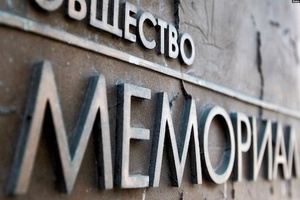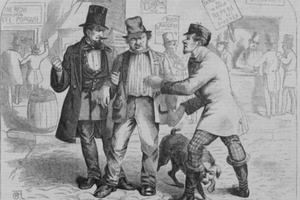-
6 mai 2025
Is this autocracy?

“Is this autocracy?” one European journalist asked me a few days ago. “Can we use the word ‘fascism’?” asked another. I’ve been answering the latter question for most of a decade now; and my answer has been yes, we can—with the caveat that I would avoid fetishizing these categories. No historical situation is ever exactly the same as any other. At the present moment, “fascism” has felt most useful with respect to both my own country, the United States, and Russia. It would benefit, though from a modifier—“neo” for instance—to suggest the postmodern, “post-truth” version in distinction to 20th century forms. lire la suite
-
21 novembre 2024
The significance of Trump's victory

Any Democratic Party candidate would have faced a daunting challenge in 2024. Political scientists have found that the two most reliable indicators of an incumbent party’s chance for re-election are voters’ evaluation of whether the country is going in the right direction, and whether voters judge that they are better off today than in the past. Still, despite the substantial odds against a Harris victory, the election was extremely close. lire la suite
-
24 juillet 2023
Memorial: War of Memories

Memorial, Nobel Peace Prize 2022 shared with Ales Bialiatski, Belarusian human rights activist in prison, and the Ukrainian Center for Civil Liberties, has been witnessing since 1991 all the upheavals of civil society in Russia and its former empire. lire la suite
-
1 juillet 2023
Riots in France: anything new since 2005?

The violence that has erupted in several French communes following the tragic death of young Nahel last Tuesday has come as no surprise to those familiar with the situation. Unfortunately, the factors that were at the root of the 2005 riots are still present. And two novelties make the situation even more difficult to manage. lire la suite
-
16 février 2021
Claims of electoral fraud are as American as apple pie

For a non-American observer, US presidential elections can be quite surprising. On top of a system of Electors and swing states, voting by mail or without a voter ID seems an open door for fraud. But claims of electoral fraud are nearly as ancient as the US democracy, and point to the conflicting views of many voters towards immigration and minorities. Federalism prevents any harmonization across states. lire la suite
-
20 janvier 2021
Facebook, Twitter, ending the hypocrisy

Can Twitter and Facebook still say, after censoring the President of the United States, that they have no editorial responsibility for the content they publish? To ask the question is to answer it. This calls for enhancing regulation. But how? lire la suite
-
4 février 2019
The European way of designing smart cities

Though often regarded as more advanced in both design and implementation of innovative models, European cities face specific issues that challenge the very notion of “smart city.” Is it possible for a data-driven city to preserve this delicate mix of rational and irrational that seems to define the European urban experience? lire la suite
-
15 janvier 2018
Haute tension en Argentine: les suites de l’affaire du juge Nisman

Vingt-quatre ans après l’attaque terroriste à la bombe contre l’AMIA, mutuelle juive de Buenos Aires, qui fit 85 morts et plus de 200 blessés, et la mort en 2015 du juge Nisman chargé de l’enquête, la police et la justice argentines progressent dans leur recherche des auteurs de la mort du juge Nisman, et de ceux de l’attentat de l’AMIA, dans un climat tendu… lire la suite
-
19 juin 2015
The case for a European data policy

A consistent set of European standards could prove to be a lever for framing a digital industrial policy. In a legal framework where individuals come under high protection, the winners will be the enterprises who inspire enough confidence to obtain the users’ consent to access and use their personal data. Trust, says Rachel Botsman, is the currency of the 21st Century. Maybe. But data is the commodity of the future, and those who can combine trust and valuable data can lead the race. It has just started. lire la suite
-
16 novembre 2011
The New Everyday

Much of what I have previously written in this website suggests a powerful, albeit mostly implicit, motif. The profusion of technological information that is characteristic of our age is rapidly moving beyond the borders of social and economic institutions in which it was originally spawned in the form of filing, indexing and data processing. It increasingly infiltrates and ultimately colonizes everyday living. The relevant developments are certainly associated with the massive involvement of the internet in social life but they have further been reinforced by growing bandwidth, media convergence and social networking. They have, of late, been given a new push by the the rapid diffusion of a battery of potent portable and connectible digital devices such as smartphones, digital cameras and tablet computers that are operating across the traditional semiotic borders of text, sound and image and the separate technological conventions to which reading, listening and viewing have traditionally belonged. lire la suite
-
8 juillet 2009
Attempting the Impossible: constructing Life out of Digital Records

Human living and knowing are bound to vacillate between the sensible and the intelligible, what can be experienced through the senses and what can be thought (including counting and calculation) without immediate reference to palpable reality. Perception is a vital and inseparable component of living and, though shaped by culture, it is firmly anchored into the human sensorium. At the same time, living and knowing always transcend the givens of perception and entail cognitive operations that lack ostensive reference, being conceptual or abstract. lire la suite
-
23 avril 2008
Databasing Life Patterns
Over the last two decades, many of us have felt the gradual and expanding involvement of technological information and the internet in our lives. However, more often than not, we fail to appreciate the subtle and pervasive implications these developments may have for the ways we think and behave. The accumulation of information, from the growing expansion of the trivial to the serious aspects of life that are recorded in databases (e.g. financial, medical or legal records, online habits) and the increasing sophistication of computer technology converge to confer to data and information a new and interesting role in the lives of people and the functioning of institutions. Information is not any longer confined within the world of computer-based experts. lire la suite
-
11 septembre 2006
Why multiculturalism should not be abandonned
In an article published in the Observer newspaper recently, a reporter writes of his visit to a local mosque. It was not just any mosque, but one frequented by some of the British Muslims held by the police in the plot to bring down several transatlantic planes. The reporter talks of meeting two TV teams at the mosque. One, from the US, came to try to find out why the UK is a hotbed of Muslim violence; the other team, which was French, was there to report upon the collapse of the British model of integration. lire la suite
